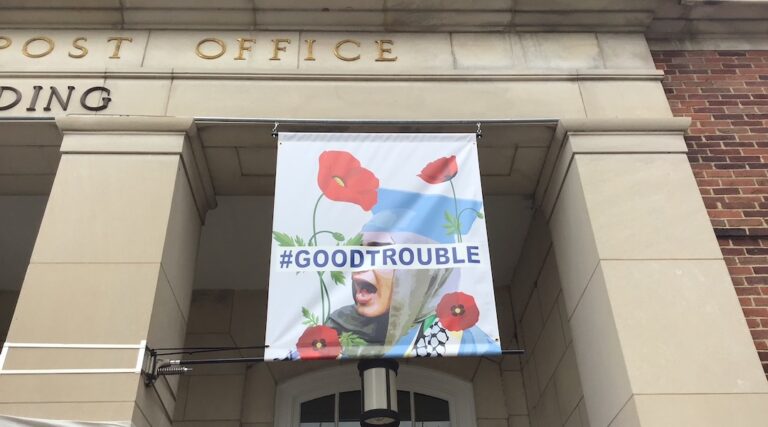The recent controversy in Chapel Hill over the keffiyeh on the banners highlights the deep divisions and sensitivities surrounding the symbol. For some, it represents a call for justice and solidarity with oppressed peoples, while for others, it is seen as a direct threat to their safety and well-being. As tensions continue to rise, it is clear that the keffiyeh has taken on new meanings and implications in the wake of recent events. It is essential for communities to engage in meaningful dialogue and understanding to navigate these complex issues and strive towards healing and reconciliation. The keffiyeh, a traditional Arab headdress, has become a controversial symbol in recent years, with some viewing it as a symbol of violence against Jews, while others see it as a symbol of solidarity with Palestinians. The debate over the keffiyeh highlights the complexities of cultural symbols and their meanings in a politically charged world. The story of Eleanora Kogan, who experienced panic attacks at the sight of keffiyehs, and the legal battle between the Park Slope Food Co-op and its Jewish members, sheds light on the deep emotions and divisions surrounding the issue.
The controversy surrounding the keffiyeh is not limited to the Park Slope Food Co-op or the Weather Channel. CEO Jonathan Greenblatt’s remarks comparing the keffiyeh to a swastika armband sparked anger from Muslim and Palestinian solidarity groups, who accused him of demonizing the keffiyeh. The debate over the keffiyeh is part of a broader conversation about the intersection of politics, culture, and identity.
As the keffiyeh continues to be a symbol of protest and solidarity in various contexts, it is important to consider the diverse perspectives and emotions that it evokes. The story of Eleanora Kogan and others who have had visceral reactions to the keffiyeh serves as a reminder of the power of symbols and the importance of understanding their meanings in a nuanced way.

That type of drama points to the increasingly common sight of left-wing Jewish activists adopting the garment as a show of solidarity with Palestinians. At college encampments, klezmer concerts, and protests by groups like Rabbis For Ceasefire since Oct. 7, it has not been uncommon to spy crowds of mostly young Jews sporting keffiyehs along with a matching kippah or tallit.
“When Zionist Jews see anti-Zionist Jews like that, that punches a bigger hole in their rhetoric than seeing an anti-Zionist person in a hijab,” said Rifka Handelman, a Jewish anti-Zionist student activist at the University of Maryland who often dons the keffiyeh. They added that the keffiyeh “is very warm and comfy.”
To some Jews, the symbol can feel like more than a rhetorical threat. In August, a Jewish activist group in New York tried to pressure the city’s public school system to ban keffiyehs, arguing they “are not merely cultural garments, they have been adopted as symbols in response to the slaughter of Jews on Oct. 7.”
Many of Marcus’s friends and neighbors, she said, often express a desire to involve law enforcement or other disciplinary measures when they see someone wearing a keffiyeh.
Yet she cautioned that these kinds of outsized reactions could backfire, helping to create an impression of an overly sensitive Jewish community that can’t tell the difference between free expression and a physical threat.
“It becomes mangled,” Marcus said. “What is HR supposed to do with this? What system is there in this country, in this world, where we can call the cops on a shawl?”
Debates like these point to larger Jewish anxiety over navigating the uneasy post-Oct. 7 world of symbols and slogans. “I don’t think a keffiyeh announces that its wearer wants Jews dead. At least the rational part of my brain doesn’t think this,” Phoebe Maltz Bovy, an editor at the Canadian Jewish News, wrote earlier this year. “That said, am I about to make social plans with someone who isn’t even Palestinian, whose reaction to this war is to buy a scarf in support of their preferred team? I think we all know the answer.”
Back in Chapel Hill, Kaufman said she was “grateful” to the city for its decision to remove the keffiyeh banner. “I think it was a good way to handle things in the end,” she said. She also insists her bonafides as a progressive Jew haven’t changed.
“There’s a balance between the tikkun olam, repair the world, in your community and the need to focus on the Jewish world,” she said. “I sort of had a bit of an awakening in the last few years about whether I’ve been pretty neglectful of my own community, which I just assumed, erroneously, was OK. But in fact, we’re not.”
As the war drags on and pro-Palestinian activism remains widespread, Jews will have to continue to negotiate their relationship to the keffiyeh. After her incident in the diner, Kogan has tried to approach the garment with a new attitude.
“I simply have a different mindset now,” she told JTA. “So now, I’m just going to walk past. I see somebody wearing it and I’m going to look the other way. I’m just like, ‘You do you, bless you.’ My mind is much more at peace.”

